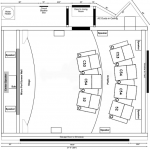 There’s lots of ways to ruin an event. Let’s talk about ruining the entertainment portion, especially if you have gone with comedy.
There’s lots of ways to ruin an event. Let’s talk about ruining the entertainment portion, especially if you have gone with comedy.
With any type of live entertainment there is a relationship between the audience and the performer. And nowhere is this more pronounced than with comedy entertainment which, when performed at the highest level, is much more like a dialogue than a monologue. The audience might be able to chat amongst themselves and still enjoy a rock band, but not so with, say stand-up: to be successful the craft requires an audience that is totally engaged.
A professional, experienced and talented comedian knows when an audience isn’t with her and will prattle, prod and engage an audience until she knows they are focused and only then will he get to the heart of her act and the business of making them laugh.
But how, you may ask, can I make a comedy entertainer’s job as difficult as possible?
Let’s say you’re a professional event planner or someone who is otherwise responsible for planning an event for your company. You’ve done your homework and found an comedian who is accomplished, a pleasure to work with and perfectly suits your needs. Now the question is, what can you do to thwart this his remarkable talents and years of experience and make everyone in attendance uncomfortable at the same time?
Here are a few simple things you can do to ensure that the delicate, essential bond between an audience and a comedian is tenuous at best or, better yet, never established in the first place.
Schedule The Entertainer Immediately After A Break
The room is pumped. The most-popular, hardest-working guy or gal in the company has just received his well-deserved award from the CEO and the energy in the room is at its peak. Whatever you do, don’t harness the audience’s energy by immediately introducing to the stage the entertainer you’ve budgeted a sizable sum to procure. Instead, have the CEO, emcee or whoever has the floor to announce a break “of about 15 minutes”. That should be enough time for the room to deflate, the energy vanish and allow the stragglers to head back into the room and settle into their seats while chatting with their fellow fellow employees about golf plans for the following weekend.
Seat The Audience At Round Banquet Tables
For the love of God, you’re not going to ensure that all the seats in the audience are facing the stage, are you? No, no, no. When an entertainer walks on stage you want roughly half the audience facing the back of the room. That way more people will be able to tell when the line for the open bar is down to only a few people. You might also consider leaving the doors in the back of the room open, allowing those seated with their backs to the stage to “people watch” the smokers, stragglers and maybe even catch a glimpse of that woman from the coat check with the ineffable aura about her. Ideally, you want these people who face the back of the room to be completely unaware of what is going on on the stage. Think muzak.
Serve Food During The Show
When a world-class comedy entertainer and a mediocre salad go head to head, the salad wins every time. Anything requiring utensils is best – after all, people are capable of enjoying a comedian with finger food like popcorn just as they are capable of enjoying a movie. Of course, it never hurts to have hard-working servers bustling from table to table pouring water, grinding pepper and sending that steak back to the kitchen until it’s done right.
Arrange For A Large, Empty Space Between The Stage And The Front Row
Nothing is more conducive to an attentive, engaged audience like seating them as close to the stage as possible. There’s an intimacy to this seating arrangement that mimics the openness and rapport of an private conversation. This is why you want a large empty space surrounding the stage. Many venues place a small stage against the wall of a large banquet hall and surround it with a large, empty dance floor: this is the ideal way to ensure your money and reputation go to waste. Nothing sends the the audience the signal “You have nothing to do with this performance” quite like seating everyone no less than a metric mile of the edge of the stage. This way audience members can chat with each other throughout the show while feeling – wrongly – that it has no impact on the overall performance.
The above are just a few basic, feng-shui examples of how to ruin the entertainment portion of your event. The truth is, there are almost as many ways to ruin it as there are second-rate entertainers to ruin it for you.
Do you know other ways to ensure that entertaining at your event is as uphill a battle as possible?
